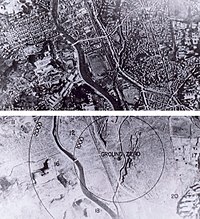ground zero
Jump to navigation
Jump to search
See also: ground-zero and Ground Zero
English
[edit]Etymology
[edit]Aerial photographs of Nagasaki, Japan, before (top) and after an atomic bomb was dropped on the city on August 9, 1945, during World War II. Ground zero (sense 1) is marked on the bottom photograph.
The Nagasaki Atomic Bomb Hypocenter monument which marks ground zero (sense 1) of the atomic bomb detonation.
From ground + zero, first attested in a June 1946 a report by the United States Strategic Bombing Survey on the atomic bombing of Hiroshima and Nagasaki, Japan, on August 6 and 9, 1945, during World War II.[1] “Zero” was used as the code name for the location of the Trinity atomic bomb test – the first detonation of a nuclear weapon – in New Mexico, USA, on July 16, 1945.[2]
Pronunciation
[edit]- (Received Pronunciation) IPA(key): /ˌɡɹaʊnd ˈzɪəɹəʊ/
- (General American) IPA(key): /ˌɡɹaʊnd ˈzɪɚ(ˌ)oʊ/, /-ˈzi(ˌ)ɹoʊ/
Audio (US): (file) - Rhymes: -ɪəɹəʊ
- Hyphenation: ground ze‧ro
Noun
[edit]ground zero (countable and uncountable, plural ground zeroes)
- Originally, the point on the land or water surface below which a nuclear bomb detonates in the air; now also the point on such a surface at or above the detonation.
- 1946 June 19, U.S. Strategic Bombing Survey, “The Effects of the Atomic Bombings”, in The Effects of the Atomic Bombings of Hiroshima and Nagasaki[2], [s.l.]: Chairman’s Office, →OCLC, archived from the original on 10 August 2021, page 5:
- Some of the construction details (reinforcing rod splices, for example) [in Hiroshima and Nagasaki, Japan] were often poor, and much of the concrete was definitely weak; thus some reinforced concrete buildings collapsed and suffered structural damage when within 2,000 feet of ground zero, and some internal wall paneling was demolished even up to 3,800 feet.
- 1986, "Weird Al" Yankovic (lyrics and music), “Christmas at Ground Zero”, in Polka Party![3]:
- It's Christmas at ground zero / The button has been pressed / The radio / Just let us know / That this is not a test
- (by extension) The location of any disaster or violent assault.
- 2011 April 21, Suzanne Goldenberg, quoting Jan Jarrett, “Pennsylvania: the ‘ground zero’ of the US shale gas drilling boom”, in The Guardian[4]:
- "This is ground zero," she said. "If regulators don't adopt a zero tolerance for violations of standards then what we will have are places that are going to have unacceptable environmental damage."
- 2019 October 17, Matt Stieb, “Florida GOP Regrets ‘Lost’ Decade on Climate Change”, in New York Magazine[5]:
- Florida has been called a “ground zero” for climate change in America, as the state is expected to face the highest temperature rise in the southeast; […]
- 2020 January 10, Liz Barney, Michelle Broder Van Dyke, “Welcome to Hawaii's ‘plastic beach’, one of the world's dirtiest places”, in The Guardian[6]:
- For Larson and other activists, Kamilo Beach has become ground zero of the crisis.
- 2021 May 3, Chris McGreal, “‘Ground zero of the opioid epidemic’: West Virginia puts drug giants on trial”, in The Guardian[7]:
- The two West Virginia local authorities accuse the distributors of turning Cabell county, with a population of just 90,000, into the “ground zero of the opioid epidemic sweeping the nation”, by flooding the area with nearly 100m opioid pills over a decade.
- (figuratively) The point at which something begins.
Alternative forms
[edit]Hypernyms
[edit]Derived terms
[edit]Translations
[edit]point on the land or water surface below, at, or above the detonation of a nuclear bomb
|
location of any disaster or violent assault
point at which something begins
References
[edit]- ^ U.S. Strategic Bombing Survey (1946 June 19) “The Effects of the Atomic Bombings”, in The Effects of the Atomic Bombings of Hiroshima and Nagasaki[1], [s.l.]: Chairman’s Office, →OCLC, archived from the original on 10 August 2021, page 5: “For convenience, the term ‘ground zero’ will be used to designate the point on the ground beneath the point of denotation, or ‘air zero’.”
- ^ William L[eonard] Laurence (1946) Dawn over Zero: The Story of the Atomic Bomb, New York, N.Y.: Alfred A[braham] Knopf, →OCLC, page 4.
Further reading
[edit] ground zero on Wikipedia.Wikipedia
ground zero on Wikipedia.Wikipedia - “ground zero, n.” under “ground, n.”, in OED Online
 , Oxford, Oxfordshire: Oxford University Press, June 2021.
, Oxford, Oxfordshire: Oxford University Press, June 2021. - “ground zero, n.”, in Lexico, Dictionary.com; Oxford University Press, 2019–2022.
Categories:
- English compound terms
- English terms with IPA pronunciation
- English terms with audio links
- Rhymes:English/ɪəɹəʊ
- Rhymes:English/ɪəɹəʊ/3 syllables
- English lemmas
- English nouns
- English uncountable nouns
- English countable nouns
- English multiword terms
- English terms with quotations
- English compound nouns
- en:Atomic bombings of Hiroshima and Nagasaki
- en:Nuclear warfare
- en:Zero

